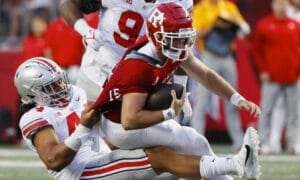Jim Florio, a Democrat who served as governor of New Jersey from 1990-1994, died on Sunday night at age 85.
As the third governor of the state since casino gambling came to Atlantic City in 1978, Florio was seen as more of a friend to the industry than Republican predecessor Thomas Kean. The industry was so eager for Florio to be of assistance that it published a “wish list” of measures just days after the November 1989 election.
Trump Plaza Casino Hotel President Jack O’Donnell said at the time, “Certainly [Florio] getting involved in the redevelopment of the infrastructure in this area is critical. He’s got to come down here and take a look and get involved. He has to be a leader for this area that he claimed to be in his campaign.”
In June 1991, Florio came to the city to sign a bill into law implementing a number of measures sought by casino industry leaders. A key aspect of the new law allowed the casinos to operate 24 hours a day on weekends and holidays, boosting revenue for casinos that were about to receive competition from rivals in Delaware and Connecticut and, eventually, Pennsylvania and New York. A year later, a followup law permitted 24-hour gambling on any day.
New table games such as pai gow also became legal, and the maximum amount of casino floor space for lucrative slot machines rose from 30% to 45%.
Florio — who attended the 1964 Democratic National Convention in Atlantic City that produced negative reviews by much of the national media — once said that he “didn’t have a moralistic approach to gambling. I think gambling is a business. If it’s run well, it can be a good business. If it’s not run well, it can be a bad business.”
PASPA and Florio
Florio also was a prominent player in a political melodrama in Trenton that created the long and winding path toward the state’s eventually successful legal effort for the vacating of the Professional and Amateur Sports Protection Act of 1992, better known as PASPA.
That law — sponsored by former U.S. Sen. Bill Bradley of New Jersey — effectively gave Nevada a nationwide monopoly on Las Vegas-style sports betting. But lobbying by New Jersey elected officials produced a “carveout” that gave New Jersey, at the time the only other state with legal casino gambling, one year to pass a law approving similar sports betting for Atlantic City casinos.
Former state Sen. Ray Lesniak recalled to NJ Online Gambling on Monday that his chamber quickly backed the idea, which also would have had to be approved by voters in a statewide referendum in November 1993.
But before that could happen, the state Assembly had to approve the measure. The bill never got out of committee, however, and the window for Atlantic City closed by Election Day. Elected officials have differed since on the reasons why the bill stalled, but Lesniak is among a large contingent that blamed state politics and Assembly Speaker Chuck Haytaian.
“Chuck blocked the bill because he correctly believed that a sports betting ballot question would boost turnout in urban areas,” Lesniak said Monday. “And as it turned out, that made all the difference.”
Incumbent Florio was beaten by Republican challenger Christie Todd Whitman by just 1% in that gubernatorial election.
In an interview earlier this year, Haytaian disputed Lesniak’s contention. However, he sent the bill to a committee chaired by sports betting opponent Rodney Frelinghuysen, pretty much ensuring the bill’s doom.
What might have been
Whatever the reason for the stalling of the bill, it changed the course of the future of legal gambling in the U.S.
The carveout, if implemented, would have provided Atlantic City casinos with a monopoly on legal sports betting on the East Coast. It also would have meant there would be no need for the state to approve a sports betting referendum in 2011 that led to a six-year court battle that ended with the U.S. Supreme Court voiding PASPA in May 2018.
There is little indication that elected officials in any other state would have been willing to spend millions in legal fees trying to upend PASPA.
Another wrinkle: The New Jersey horse racing industry, already having begun a downturn in the early 1990s, would have been left out in the cold. Under the existing decade-old state sports betting law, the tracks and the casinos each have the right to offer sports betting both at their brick-and-mortar sites and online. Meadowlands Racetrack operator Jeff Gural and Monmouth Park counterpart Dennis Drazin each have pointed to the additional revenue from sports betting partnerships as helping to keep their tracks in business.
And in a parallel universe where Atlantic City casinos have sports betting as of 1993, would those casinos have been able to extend that reach to online betting decades later and not violate the terms of a still-existing PASPA federal law? Lesniak, an attorney, said that premise was “complicated.”
Less complicated is the fact that due to some New Jersey political machinations almost three decades ago, the door eventually was opened for any state to offer sports betting if its elected officials choose to do so.
Photo: Chris Pedota/The Record/USA TODAY










